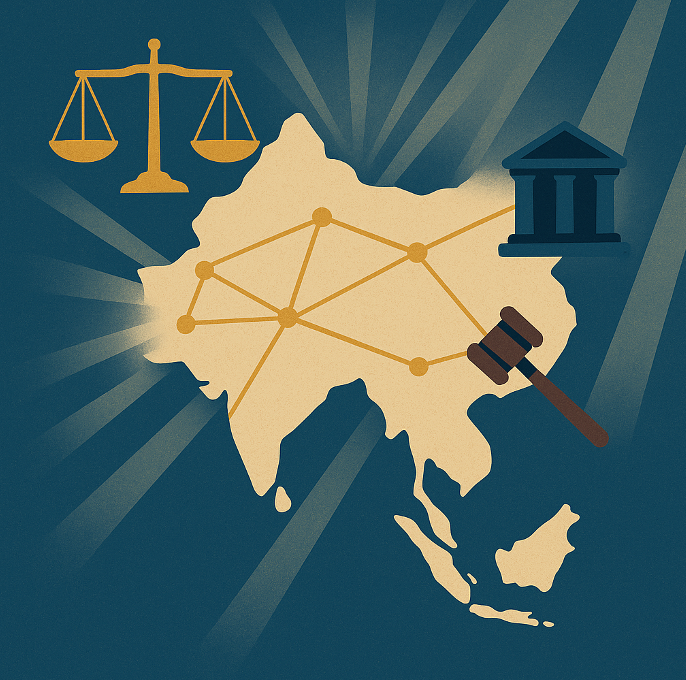By Stephany Aw
This blog post is adapted from the author’s presentation at the 10th Biennial Conference of the Asian Society of International Law in Hanoi, Vietnam from 9 to 10 October 2025.
I. Introduction
The participation of Asian states in the development of international law through international judicial proceedings remains an under-explored topic. This post argues that Asian States can make an impact on the development of international law through their participation in advisory proceedings. In this respect, two key modalities are identified. First, Asian States’ submissions in advisory proceedings may influence the outcome of the eventual advisory opinions rendered, with such opinions themselves being influential in the development of international law. Second, Asian States’ submissions in advisory proceedings may independently act as evidence of elements necessary for the identification or interpretation of rules of international law, such as State practice and opinio juris in the context of identifying customary international law, or subsequent practice in the context of treaty interpretation.
This post focuses on the first modality, analyzing Asian States’ participation in two sets of proceedings that culminated in advisory opinions in 2024: (a) Request for an Advisory Opinion Submitted by the Commission of Small Island States on Climate Change and International Law (the ITLOS Opinion); and (b) Legal Consequences Arising from the Policies and Practices of Israel in the Occupied Palestinian Territory, including East Jerusalem (the ICJ Opinion). For present purposes, the term “Asian States” adapts from a previously proposed definition to mean twenty-nine States falling within the United Nations’ “Asia-Pacific” Group. Thus, the former set of proceedings saw ten Asian States making written and/or oral submissions, while the latter saw seven Asian States making both written and oral submissions.
II. The role of advisory opinions in the development of international law
In general, advisory opinions are not legally binding. Nevertheless, they have been recognized as exerting authoritative influence on the development of international law. Such development can happen where, for instance, an advisory opinion clarifies the interpretation of a treaty provision, or identifies the existence or content of an unwritten rule of international law.
In a demonstration of this influence, both the ITLOS and ICJ Opinions have been the subject of widespread commentary noting their significance. Amongst its many noteworthy findings, the ITLOS Opinion clarified the fundamental point that substantive obligations of States Parties to the 1982 United Nations Convention on the Law of the Sea (UNCLOS), such as that under Article 194(1), apply to anthropogenic greenhouse gas (AGHG) emissions. The ICJ Opinion was also significant for clarifying the applicable law for determining the legality of an occupation, and consequently the factors that could render an occupation such as Israel’s illegal.
III. The influence of Asian States’ submissions on the ITLOS and ICJ Opinions
To determine the possible influence that Asian States’ submissions had on the ITLOS and ICJ Opinions, key findings in these opinions have been compared with the submissions of individual Asian States, rather than Asian States as a group. This is because, consistent with the region’s well-known diversity, not all Asian States took the same or similar positions in both proceedings. Areas of alignment are highlighted below as suggesting that there may have been some persuasive impact of specific Asian States’ submissions. Even where there are areas of divergence, the relevant opinion is considered further to determine whether and how the Tribunal or the Court rationalized their departures from Asian States’ submissions. This is because such rationalization may suggest that the Tribunal or Court at least considered those submissions, even if the Tribunal or Court was not ultimately persuaded by them.
A. The ITLOS Opinion
At the ITLOS, the majority of participating Asian States (Bangladesh, the Philippines, the Republic of Korea, Singapore, Timor-Leste, and Viet Nam) took a position aligned with the Tribunal’s finding that AGHG emissions fall within the definition of “pollution of the marine environment” under Article 1(1)(4) of UNCLOS, such that obligations under Part XII of UNCLOS referring to the same term apply to AGHG emissions. Notably, the Tribunal observed that a large majority of participants in the advisory proceedings, which would have included these Asian States, took the same view as it did on this issue.
Moreover, the Tribunal noted the existence of participants’ views to the contrary, highlighting the unattributed view that treating AGHG emissions as falling within “pollution of the marine environment” would be “tantamount to the Tribunal exercising legislative functions”. This was a view expressed almost verbatim in India’s oral submissions. Thus, even Asian States’ submissions that diverged from the Tribunal’s eventual findings were shown to have been considered by the Tribunal, and formed part of its reasoning.
B. The ICJ Opinion
Similar to the Court’s indication that it is the rules and principles of general international law that are determinative of the question of the legality of an occupation, rather than jus in bello or international human rights law, some Asian States (China, the Maldives, Pakistan) also drew a distinction between these legal frameworks in their submissions on the matter of the legality of the Israeli occupation.
However, there were other Asian States (Bangladesh, Indonesia) who took the different view that the legality of the Israeli occupation should be assessed by reference to the law of occupation itself. It is nevertheless significant that the factors cited by this latter group of States as rendering the Israeli occupation illegal substantially overlapped with those identified by the Court in its reasoning as to why Israel’s presence as an occupying Power in the Occupied Palestinian Territory was unlawful. These factors were Israel’s violations of the prohibition of the acquisition of territory by force and the Palestinian people’s right to self-determination. In other words, even where the Court did not adopt the same legal framework as that advocated by some Asian States, the Court’s substantive reasons for finding the Israeli occupation unlawful still partly coincided with their submissions.
IV. Conclusion
As seen from the foregoing, Asian States can and do impact the development of international law through their participation in advisory proceedings, with their submissions being capable of influencing the eventual advisory opinions rendered. Their continued engagement with these processes of international courts and tribunals is therefore something to be encouraged.
About the author
Stephany Aw is a DPhil candidate in Law at the University of Oxford. The views expressed in this blog post are the author’s own and do not necessarily reflect the views of any institution with which she is or has been affiliated.
Image credit: AI-generated (source: ChatGPT)





